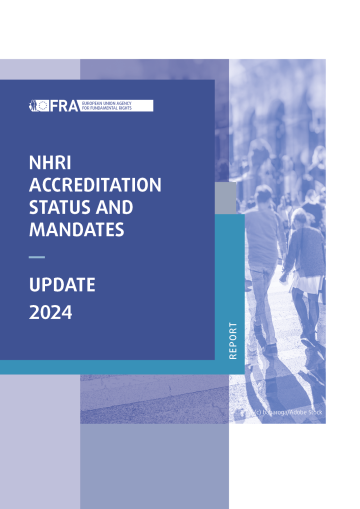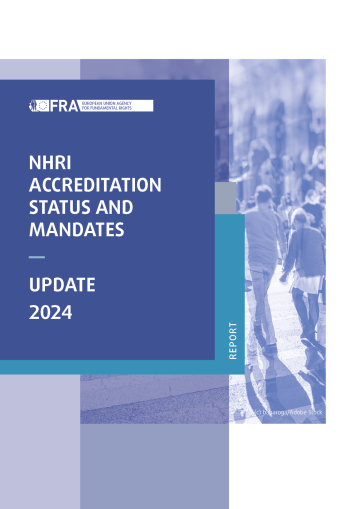The Common Provisions Regulation (2021/1060) on EU funds has opened up the possibility for NHRIs (along with Equality Bodies and Ombuds Institutions) to play a role in fundamental rights-related monitoring in the use of eight major EU Funds at the national level. ENNHRI issued a statement on the potential role of NHRIs in the context of the EU funds in 2022, and in December 2023 FRA released a major report on EU funds: Ensuring compliance with fundamental rights. The report includes recommendations for EU and national policy makers on how they could benefit from the expertise of NHRIs when implementing EU funds in a way that is compliant with the EU Charter of Fundamental Rights and the provisions of the Convention on the Rights of Persons with Disabilities, as required for the Funds governed by the Common Provisions Regulation for the programming period 2021–2027.
FRA collected information from NHRIs for the preparation of a 2020 report asking whether they are engaged in the monitoring of the EU funds implementation. Back then only three NHRIs reported such an involvement. In 2023, out of the 26 NHRIs that responded to this question, 13 NHRIs indicated they were engaged in the monitoring of fundamental rights compliance in the use of EU funds at national level. With regard to challenges, eight NHRIs indicated lack of capacity and resources and three NHRIs highlighted lack of impact, lack of knowledge and lack of resources as the main challenges in performing their role. Two NHRIs encountered challenges such as lack of clarity due to insufficient guidance by the European Commission. When responding to the survey, some NHRIs mentioned the unclarity of mandates of EU funds monitoring committees or decision-making on projects and their concrete involvement remaining quite abstract. Several NHRIs observed a need to raise the government’s awareness of the obligations regarding the EU Charter of Fundamental Rights and four indicated challenges regarding interference into the independence of the institution.
On the positive side, some governments have reached out to the respective NHRI in their country, to seek training on the EU Charter of Fundamental Rights, while some NHRIs have issued guidance to the national authorities on monitoring the compliance of EU funds with fundamental rights.
Table 5 – NHRIs that are engaged in monitoring fundamental rights in the use of EU funds: challenges in performing their role
|
NHRI (or nearest equivalent) |
Lack of capacity and resources |
Lack of impact |
Lack of knowledge |
Interference into the independence or mandate of the institution |
Other |
|
Inter-federal Centre for Equal Opportunity and the fight against racism and discrimination (Unia) (Belgium) |
Yes |
|
Yes |
|
|
|
Ombudsman of the Republic of Bulgaria |
Yes |
|
|
|
|
|
Ombudswoman of the Republic of Croatia |
Yes |
Yes |
Yes |
|
|
|
Commissioner for Administration and the Protection of Human Rights (Cyprus) |
|
|
Yes |
|
|
|
Finnish Human Rights Centre |
Yes |
|
|
|
Yes |
|
Greek National Commission for Human Rights |
Yes |
|
Yes |
|
|
|
Irish Human Rights and Equality Commission |
Yes |
Yes |
Yes |
Yes |
Yes |
|
Ombudsman's Office of the Republic of Latvia ** |
|
|
|
|
|
|
Commissioner for Human Rights (Poland) |
Yes |
|
|
Yes |
|
|
Portuguese Ombudsman |
|
|
|
Yes |
|
|
Romanian Ombudsman |
|
|
|
|
|
|
Human Rights Ombudsman of the Republic of Slovenia ** |
|
|
|
|
|
|
Ombuds institution of Spain |
Yes |
Yes |
Yes |
Yes |
|
Note: ** highlights NHRIs that have not provided answers to the survey.
Source: FRA, December 2023.
For more information see: Supporting National Human Rights Institutions in monitoring fundamental rights and the fundamental rights aspects of the rule of law | European Union Agency for Fundamental Rights (europa.eu)
Table 6 – Reasons for NHRIs not to engage in monitoring fundamental rights compliance in the use of EU funds
|
NHRI (or nearest equivalent) |
Not invited by the responsible authorities |
Lack of human / financial resources |
Lack of knowledge |
Concerns regarding the independence or mandate of the institution |
Not relevant for the institution |
Other |
|
Austrian Ombudsman Board |
Yes |
Yes |
Yes |
Yes |
Yes |
|
|
Federal Institute for the Protection and Promotion of Human Rights (FIRM) (Belgium) |
|
|
|
|
|
Yes
|
|
Public Defender of Rights (Czechia) |
|
|
|
|
Yes |
|
|
Chancellor of Justice (Estonia) |
|
|
|
Yes |
|
Yes |
|
Parliamentary Ombudsman (Finland) |
|
|
|
|
Yes |
|
|
National Consultative Commission on Human Rights (France) |
Yes |
Yes |
|
|
|
|
|
German Institute for Human Rights |
|
Yes |
|
Yes |
|
Yes |
|
Office of the Commissioner for Fundamental Rights ** |
|
|
|
|
|
|
|
The Seimas Ombudsmen’s Office (Lithuania) |
Yes |
Yes |
|
|
Yes |
|
|
Consultative Human Rights Commission of Luxembourg |
Yes |
Yes |
Yes |
|
Yes |
|
|
Netherlands Institute for Human Rights |
Yes |
|
|
|
|
|
|
Slovak National Centre for Human Rights |
Yes |
Yes |
|
Yes |
|
|
|
Equality Ombudsman (Sweden) |
|
|
|
|
Yes |
|
Note: ** highlights NHRIs that have not provided answers to the survey.
Source: FRA, December 2023.






